#zutara meta
Text
The Fortune in The Fortune Teller
This is an isolated look into this specific episode.
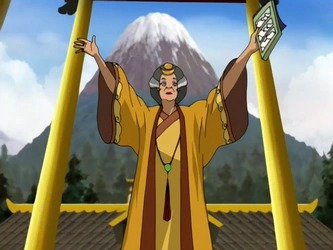
The Fortune Teller is the 14th episode of book 1 of Avatar: The Last Airbender. It is famous for supposedly developping the show's romantic subplot between Katara and A\ang. The episode does two things: A\ang attempts to flirt with Katara, and Katara is finally willing to consider him as more than just a friend.
However, I believe that this episode could have masterfully foreshadowed the pair not getting together in the end. In this essay I will detail how each step the episode takes towards a Kat@ang endgame is actually foreshadowing the opposite.
1. Katara and the Nature of Destiny
In the beginning, the Gaang meets a person getting attacked by a bear. He is acting incredibly passive, simply dodging the bear's attemps at his life. Then, A\ang and Appa interfere to help the man. When the Gaang questions him on why he was so passive, he says it's because the Fortune Teller told him he'd have a safe journey. They then have the following exchange:
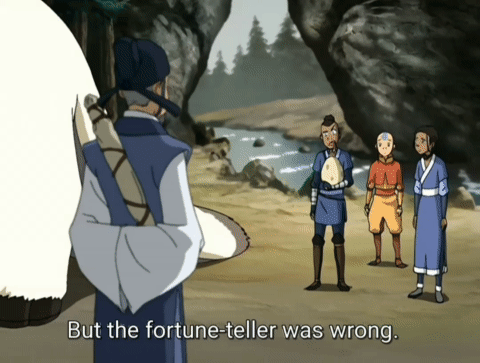
The man's logic is obviously flawed. If the Gaang didn't interfere, if the man continued to passivaly dodge, the bear would have attacked him. Fortune and destiny come from agency – from actively shaping them.
However, Katara is delaited at the prospect of seeing the future. Her and the Gaang go to meet the Fortune Teller, Aunt Wu. Aunt Wu tells her she'll marry a very powerful bender. Later, she comes back asking more details about her future husband. Remember her excitment, fantacising about her future husband:
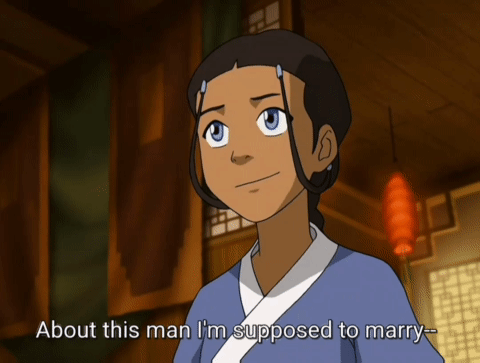
After that, Katara becomes somewhat reliant on Aunt Wu's prophecies. She goes as far as to ask her what she should eat.
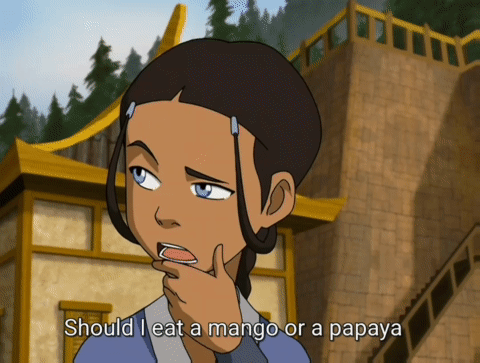
And she obeys her "prophecy", despite not wanting to. She became like the man from the beginning. She knowingly follows the fortune even though it doesn't make sense. She had given up on forging her own destiny.
Although by the end of the episode, she is no longer in this state of reliance, she still believes in the prophecies. Then, Sokka says that A\ang is a very powerful bender. This reminds her of what Aunt Wu said about her future husband. I don't want to cherry pick, so I took 4 different pictures of her face when she realizes A\ang might be the powerful bender she is to marry:
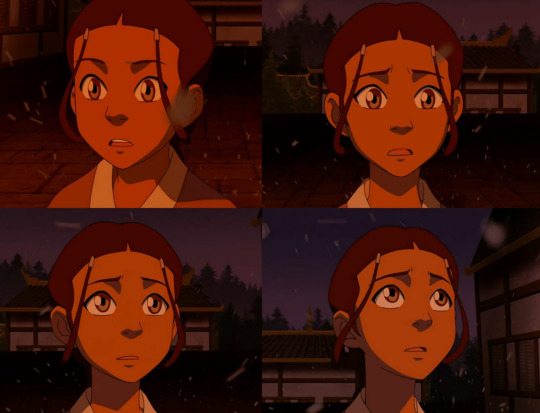
With the look in her eyes, with her mouth tilted down and with the ominous music, this could easily be read as disappointment. Especially when remembering how she fantacized about the powerful bender earlier in the episode. She doesn't smile, but looks concerned. As if she doesn't want this. Earlier in the episode, she says this:
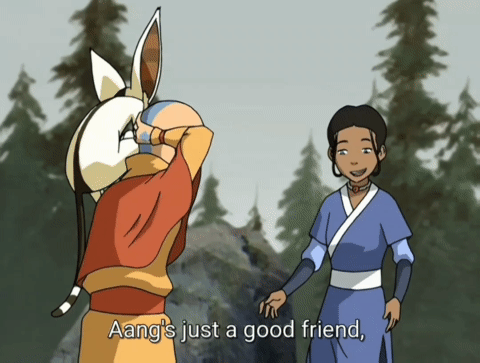
A\ang is like the papaya. The fortune says he's right for her, but Katara doesn't want him. Now, she isn't like the man, passively dodging the bear attacking her. She shouldn't sit and wait for the prophecy to come true point blank. She has the agency to shape her own destiny and not to choose A\ang as her future husband.
2. A\ang, Meng, and First Crushes
In this episode we're introduced to a girl named Meng. Aunt Wu told her she'd end up with someone like A\ang, and so she developped a one sided crush on him. Throughout the episode she attempts to talk to him, all to no avail. Because A\ang is not interested in her.
Interestingly, her one sided crush is directly paralleled to A\ang's crush on Katara.
Exhibit A:
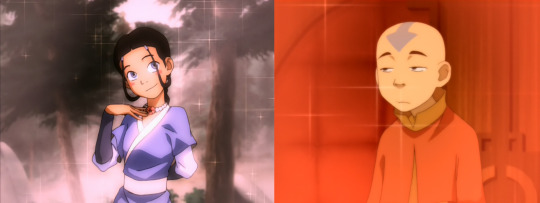
Exhibit B:
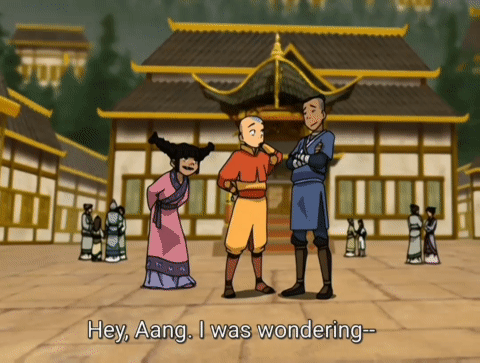
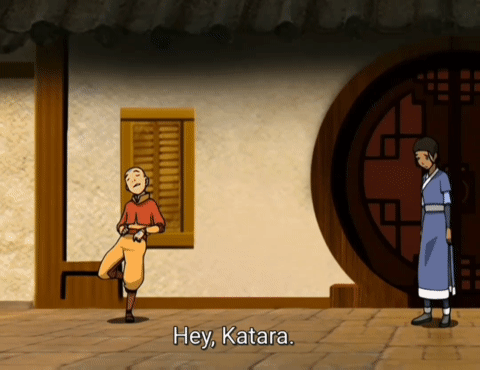
Exhibit C:
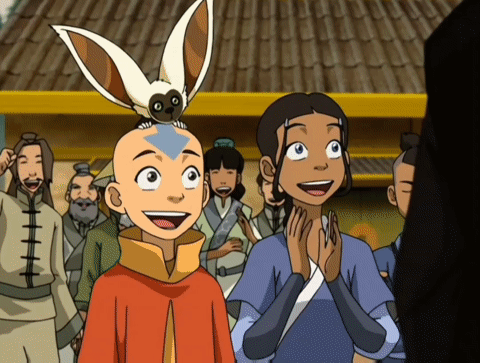
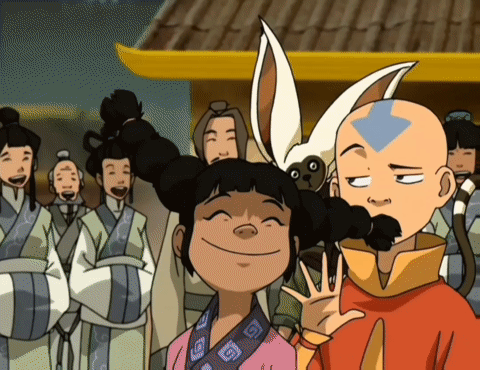
Please note that in exhibits B and C in particular, there is an emphasis on the other party not reciprocating their feelings.
In this parallel the show draws, A\ang is Meng, the younger, shorter one the one who is in love; and Katara is A\ang, the older, taller one who... *checks notes*... doesn't reciprocate.
But in the end, A\ang and Meng have a heart-to-heart.
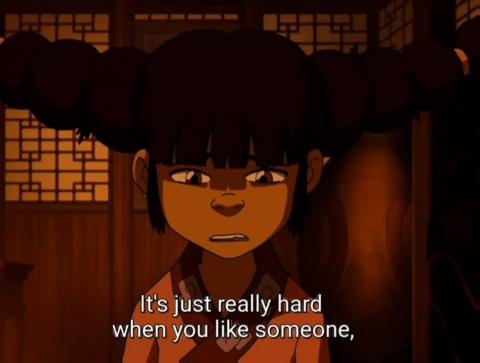
Sometimes you'll like someone, and they aren't going to feel the same way, and even though it's hard, it's okay. They're young, just kids having a crush. A\ang responds to this with "I know what you mean". Because he, just like the audience that watched the parallels, knows that Katara likely doesn't return his feelings.
———————
In conclusion, The Fortuneteller could have been brilliant foreshadowing to Kata\ang not being the endgame couple, and it would have done so through beautiful, mature lessons about first loves and destiny. Thank you for reading.
#anti kataang#zutara#atla critical#anti anti zutara#pro zutara#zutara analysis#zutara evidence#zutara forever#zutara meta#zutara nation#zutara should have been canon#zutar#zutara supremacy#zuko x katara#katara x zuko#katara#meng
95 notes
·
View notes
Text
Ugh I will always love the concept of Katara using blood bending to revive Zuko after the last agni kai, mostly because it makes no sense to me that Zuko was able to bounce back so easily after being struck by lightning, but also because the way the show treats bloodbending is just odd to me. It was a defense mechanism created by a traumatized victim of some of the most devastating parts of colonization, and although I understand that Hama was supposed to symbolize the "bad parts" of waterbending and was important for Katara's growth in realizing that the world isn't entirely black and white, its still disappointing to me that the show never explored the gray areas of blood bending, especially since that episode was, as I stated above, about understanding the gray areas of the war. Katara using blood bending to revive Zuko would add so much to the last agni kai in demonstrating that she has truly realized that "good" and "evil" are relative concepts, and Zuko being saved by both a defense mechanism of a survivor of colonialism and a type of bending used to terrorize his people would have even added to his arc, as the narrative required him to save and subsequently be saved by the physical embodiment of everything his family sought to annihilate.
#also just the angst potential#there are so many fics and better metas written about this but I had to throw my two cents in#Bryke's refusal to acknowledge bloodbending as anything but evil incarnate is so fucking annoying#anti bryke#bloodbending#zutara#zuko#katara#final agni kai#atla#avatar the last airbender#atla meta#zutara meta#technically
4K notes
·
View notes
Text
Zutara, romance novels, and the female gaze
Okay so I’ve been thinking about the female gaze a LOT so I checked out a subreddit about romance novels, despite never having read one. I came across this meme (which was initially a Tumblr post and then got posted to Instagram and then to Reddit and I’m now bringing back to Tumblr — Internet telephone, pls never change):
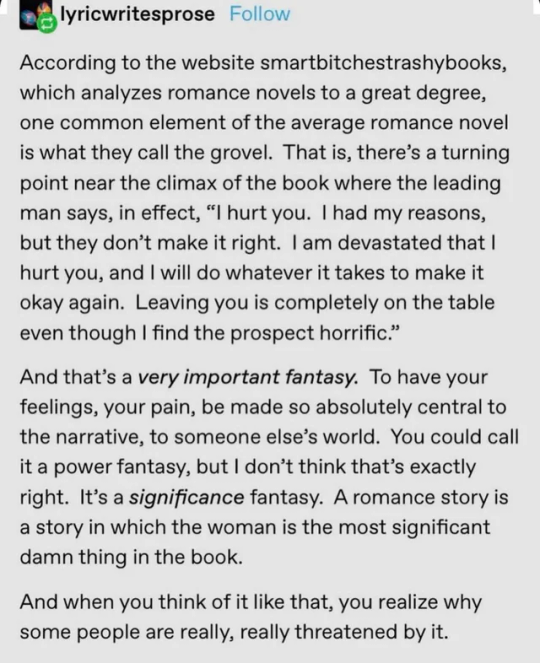
And…what is The Southern Raiders, if not a platonic grovel? Katara’s pain is central to the episode. It’s central to Zuko. Zuko asks Katara what he can do to make up for his betrayal; she demands the impossible. He reads between the lines, cockblocks her brother to get the necessary information, and then waits outside her door overnight (which he also did for Iroh, the one person we know for sure he loves). He basically makes himself a receptacle for her rage, and he holds space for her by coming with her on her revenge quest and carrying their bags and not saying a damn thing about what she should and should not do beyond like…asking her to rest. And obviously the grovel works! She forgives him and then they’re thick as thieves, bantering and fighting and saving each other’s lives, etc.
On a different note, I’ve been told that enemies to lovers is one of the biggest tropes in romance novels, similar to YA lit and fanfic. Here’s something else I found in the romance novel discourse:
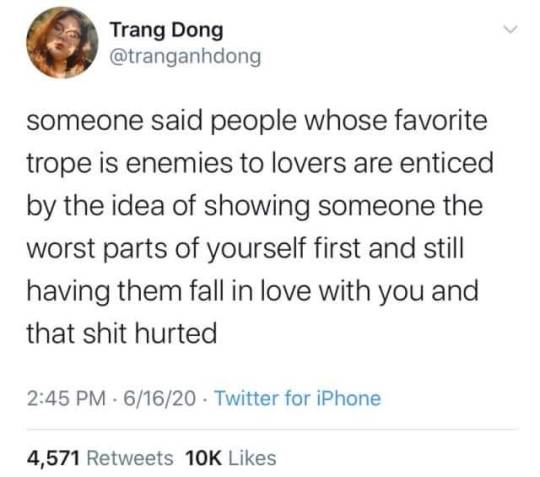
And…yeah. In TSR, Katara really does show Zuko her worst self, because she doesn’t feel the need to perform for him. She doesn’t feel the need to perform moral perfection OR cold blooded vengeance. She bloodbends in front of him and he just goes with it. She doesn’t kill Yon Rha and he just goes with it. He doesn’t treat her any differently afterwards. Maybe they talk about it off screen, but I kind of like the idea that they don’t, because Katara doesn’t need to explain anything.
And it’s so interesting, because some people in the ATLA fandom have a totally different read on TSR. They think Zuko was encouraging Katara to get revenge (by what, keeping his mouth shut?), and that Aang is the one who acts as her moral compass. I believe that either Bryan or Mike said in the DVD commentary that Aang is the angel on her shoulder the entire time. And this interpretation does make sense if you see it from the male gaze, where Katara as an object of affection is acting in an angry, irrational, threatening way. But if you see it from the female gaze, you recognize that actually it’s probably the most emotionally taxing experience Katara has to go through, and she doesn’t owe it to be nice or perfect to anybody. Katara’s formative trauma literally comes to a head, and she has to make a decision — no, a discovery — about who she is in relation to the tragedy that defines her life and even her identity (as a waterbender, as a parentified child who becomes the mom friend, as a genocide victim), and she’s accompanied by someone who trusts her judgement and validates her feelings.
I’m not saying TSR is explicitly romantically coded, but when it conforms so well to romance novel tropes…is it any wonder that so many people thought “yes this is her man?” And then he takes lightning in the heart for her and reaches for her when he’s literally dying, I will never be normal about that either
#Zutara#Katara#Zuko#the southern raiders#Pro zutara#anti Bryke#I guess#I swear I’m not a Bryke anti but I feel like they just don’t get#The female gaze#and the fact that Zutara is so female gaze is kind of an accident and I find that fascinating#atla fandom critical#The southern raiders turned me into a Zutara shipper#one ep away from the finale#Zutara meta#My meta
1K notes
·
View notes
Note
What would change in the Zutara ship/dynamic and/or Zuko and Katara individually if Zuko didn't betray Katara in Ba Sing Se and immediately chose her?
i think most canon divergent zutara fanfictions get it right: they'd probably become close friends in no time, and develop a dynamic similar to what they have in the ember island players. but there's a reason this scenario is best left to fanon - as fun as it would be to see more zutara bonding in the first half of book three, there's always something lost for something gained, and in this case it would likely come at the cost of the depth and intimacy they developed in canon through the WAT and TSR arcs.
it is vitally important to their relationship development that katara gets to be deeply, righteously angry at zuko, and particularly that she goes on her field trip to find yon rha while they're still not on friendly terms. not only does her anger bar her from instinctually falling into a caretaking role with zuko as she does with most of the gaang at one point or another, allowing her to be cared for rather than being the carer, it also frees her from feeling like she needs to fit into any perceived image he might have of her. katara makes it clear to zuko that she owes him nothing - least of all her friendship, and everything that entails.
and it is this very lack of obligation that gives katara the freedom to be wholly and entirely herself. people always point to how katara behaves "uncharacteristically" in the southern raiders to prove that zuko is a bad influence, but the truth is that the way she acts in tsr is an inherent part of who she is. katara can be cold, furious and vengeful just as she can be warm, compassionate and friendly, and the fact that she can freely show both sides to zuko isn't because he's pushing her to be someone she's not, but because she has no need to live up to an idealised version of herself.
this would likely still apply to a degree in a no-betrayal au (tsr would happen in any version of book 3, just because it's so significant to katara's arc), but i find it probable that katara might be more hesitant about bringing zuko along, or less willing to bloodbend before him so readily. katara has to witness zuko's lowest point before she allows him to see hers. she has to take her dark-night-of-the-soul journey with someone she knows has neither the right nor the willingness to condemn her choices, in order to be able to focus entirely on herself and what she needs. very telling that she doesn't ask aang, her future husband, to go with her for support.
it's because zuko allows himself to be a whetstone for the blade of her fury, because he cares enough to find out why, because he tries to help when she's given him no reason to do so, because he stands shoulder-to-shoulder with her at her darkest, most conflicted hour without forcing her to bear the burden of caring what he thinks or feels about it, that katara is able to forgive and befriend him. it is because they see each other at their highest and lowest moments that they're able to have the deepest and most intimate relationship of anyone in the gaang. and none of that would've happened without the betrayal in ba sing se.
after all, love is brightest in the dark.
403 notes
·
View notes
Text
I gotta talk about this moment even though it's been discussed a million times
Zuko, opening up to someone about his scar for the first time (from what we’ve seen in the show at least, but we can reasonably assume he hasn’t spoken about it like this since he got it) and explicitly stating that whilst he's always associated it with with failures ('the mark of the banished prince'), he's finally ready to take control and change his life for the better. And whilst he has accepted that he can never change his scar, it’s ok because he still has the power to change his destiny.
And despite this assurance, Katara, the healer, still jumps in and offers to heal it anyway, understanding that this is still a burden she could lift from him - 'What if you could be free of it?'
She knows it won't change his life in the same way taking control of his own destiny will, but still, it's like she can't help but try to ease his pain. Even if it's a pain that's long since become a permanent part of him, something that might seem surface level or cosmetic to others - 'It's a scar, it can't be healed.'
And then we have this
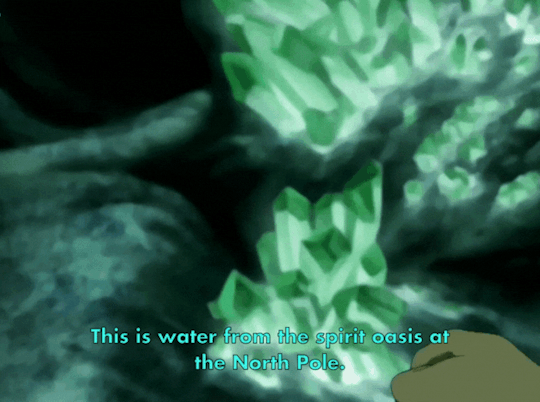

'I've been saving it for something important.'
This. Healing Zuko's scar. A wound that has, for all intents and purposes already healed and is not longer a threat to his life, but still burdens him emotionally. That has come to represent all of his trauma. This Katara considers important enough to use her limited and precious supply of spirit oasis water. In the middle of a war. In the middle of a dangerous journey to save the world in which she and her friends might be seriously injured at any time (including in this scene, where Ba sing se is literally under attack as they speak).
And if that weren't enough

'I don't know if it would work'
Now, I don't know the mechanics of spirit water in the atla universe, but it seems to be pretty heavily implied later in the episode when she uses the water to heal Aang, and for a moment thinks that it hasn't worked, that it's sort of a one-time deal.
Which means that she's willing to potentially waste the spirit water just on the off-chance that it might remove the scar. Which in the context of the wider story seems utterly insane.
But Katara thinks it's worth the risk.
And presented with this opportunity, this beautiful, selfless offer to ease his suffering, even on a purely physical, surface level, Zuko wordlessly submits, and lets her touch his scar.

Now, Katara doesn't know quite how significant this touch is (although she's very emotionally intuitive so I'm sure she has some inkling of the gravity of this action) but we do. We know that Zuko doesn't let anyone touch his scar, ever. So what this communicates to us as an audience is that Zuko is allowing himself, for the first time, to put his complete trust in someone. To be completely, 100% vulnerable with them.
And the moment of touch is all the more significant because, in many ways, it isn't even strictly necessary.
Katara's hands are empty, she isn't putting the spirit water to his face, to attempting to heal it here. And while I'd argue this touch could be a practical one - assessing the damage of the scar with her hands to see how to proceed before she uses the water - the moment after, right before they are interrupted, isn't one of practical, medical assessment, but of intimacy.
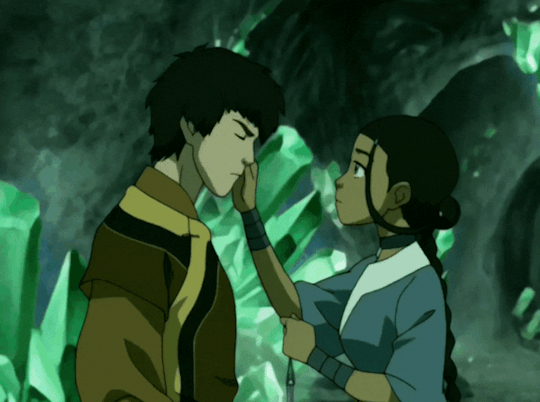
The way Zuko waits, patiently, eyes closed, and the way Katara pauses, just for a moment, doing what I can only describe as gazing at him, and that slow blink in the middle- Again, not examining his scar or reaching for the spirit water to begin, but just taking it all in.
It's so breathtakingly intimate and vulnerable - a point of connection between these two people who are supposedly so completely different but are, here, somehow so alike in their openness and understanding of one another.
That Katara offers to heal Zuko's scar even when he's said moments before that he's made his peace with the fact that he's never be free of it. And the way he accepts her offer without words because she's right, part of him does want to be free of it.
It's just an absolute masterclass in creating an immediate and powerful connection and bond between two characters in an incredibly short space of time from a start point of complete opposition without rushing it or making it seem implausible.
#I don't know how to end this is just needed to talk about this scene#they really send me into a feral frenzy#because how could this not be endgame when this scene exists???#anyway#zutara#Zuko x Katara#zutara meta#zutara analysis#my meta#atla#avatar the last airbender#my gifs
1K notes
·
View notes
Text
This is technically in response/as an addition to a post on the supposed ‘double standard’ in the fandom between Zuko and Jet as Katara’s love interests, but it’s been so long since it was posted and I figured the OP would be entirely uninterested in my word vomit, especially after like one and half years—so, separate post. I added a link for those interested. There's a cut because this got quite long lmao.
In short, the post supposes the argument that though Jet would’ve made Katara kill people (something Zuko very much Did Not Do, no matter what you think about The Southern Raiders), he cleaned up his act after this. Zuko, on the other hand, did lots of Really Bad Things to Katara & Co. with far more frequency than Jet did and got redeemed after a multitude of episodes doing Various Things Moste Evile. To then slap Jet with The Toxic Ex-label and see Zuko as the ‘healthier’ and ‘better’ option creates a Double Standard(™) within the fandom, which is supposedly bad and not an arguably incorrect reading.
But the differences in fandom perception between Jet and Zuko as Love Interests for Katara (one of which canonically, and the other potentially and apparently talked about in the writer’s room) are easily explained, as can the Supposed Double Standard—just by thinking about it from Katara’s viewpoint, or even the audience’s. Because, well, the worst things Jet ‘almost’ ended up doing didn’t happen because of outside interference only.
That’s the important bit here. He 100% would’ve drowned an entire village just to get rid of a handful of Fire Nation soldiers, had Sokka not managed to evacuate everybody. He 100% would’ve grievously injured two people who, as far as Jet and everybody else were aware, were refugees who might not even be firebenders — considering nobody else saw Iroh heat up his tea, he could’ve been wrong — in an attempt to prove his own hunch. Had the guards not been there, had Zuko not been able to fight back with swords, Jet would’ve genuinely attempted to wound them for as much as a puff of smoke. And Jet consistently involves bystanders (innocent or not) in his desperate quest to harm and defeat the Fire Nation: the Gaang (and particularly Katara, through explicitly manipulative means) and the villagers in Jet; Zuko, Iroh, and the people in the teashop in City of Walls and Secrets. Additionally, we don’t see more violence from him because he’s not a main character like Zuko is—though it’s implied that Jet beats up villagers who are supposedly in cahoots with the Fire Nation often, only agreeing to turn over a new leaf when he, Smellerbee, and Longshot decide to move to Ba Sing Se.
Zuko explicitly and frequently doesn’t harm people: that, or it isn’t important to the plot. He doesn’t burn down the village on Kyoshi, he literally only manages to lightly singe it. He threatens people with violence frequently but never actually goes in for the kill. I’d argue that the most explicitly violent thing he does in Book 1 is breaking Aang out of the Pouhai Stronghold—for his own ends obviously, but if it’s spelled like treason and sounds like treason, it’s probably treason. When he thinks of robbing the pregnant couple while he’s on the run, he stops himself of his own volition; when he considers using Appa to catch Aang (this was a point made against Zuko in the post), he’s unaware of what Appa’s been through prior to that point and sees him as no more than an animal used for travel, much like the ostrich horse he stole earlier in the season.
Zuko’s schtick throughout Book 1 and 2 is that he doesn’t want to think of the consequences of his actions. His plans are never fully complete. He doesn’t think of how he’s going to get a chained, notoriously slippery little eel of an Avatar to the Fire Nation, and he doesn’t think about what would happen to twelve-year-old Aang after they got there—which is horrible of him, but it also shows an odd, ignorant kind of innocence that you’d associate with a kid who’s got a hard time telling right from wrong. Like, I love Zuko dearly, adore him even, but kiddo doesn’t think ahead until the Book 2 finale and even that’s debatable. He’ll eventually start thinking ahead a little bit but for the most part, he doesn’t. Not saying that takes away responsibility, because it absolutely doesn’t, but it is telling of Zuko’s character: he’s an ‘act first, think later’-kind of guy, all ‘fuck around; find out; maybe success’. His sole goal throughout Book 1 and 2 is going home, without even thinking on how to get there beyond like, Avatar in my custody => back in Fire Nation with Avatar => dad loves me again. And he says that his only intention is to go home too, in Ep 2 of Book 1:
Aang: If I go with you, [He holds his staff in front of him as an offer, making sure Zuko understands that he does not wish to continue fighting.] will you promise to leave everyone alone?
[The camera cuts to a side-view of the area, Zuko's men still surrounding him, spears poised. After a brief moment of hesitation, Zuko erects himself and nods in agreement. Aang is apprehended by Zuko's men, who take his staff . . . ]
Zuko: [Boarding the ship up the walkway. Determined.] Head a course for the Fire Nation. I'm going home.
(Added emphasis for my point)
Zuko is not the Big Bad. He’s not The Largest Threat. He never is. In Book 1 it’s Zhao, in Book 2 it’s Azula, and in Book 3 it’s Ozai. Zuko is a consistent threat, yes, but not a particularly large one no matter how good of a fighter he is. Because he’s presented to us as a disastrously hurt and traumatised little brat who we, the audience, are supposed to feel sorry for, and slowly grow fond of. Because we learn in The Storm that the notion of “caring for others is weak” has literally been branded into him. Because he keeps getting back up to fight, but consistently holds back. We are shown that he knows, on some level, that what he’s doing is wrong: the text suggests that Zuko is actively suppressing his morals. And by the time Zuko hires an assassin to ensure the Avatar is dead, we know that Zuko is incredibly unhappy with his choice(s) and is desperate to be safe; that he’s uncomfortable but wants to be comfortable; that he’s incorrect about the source of his fear while he’s back in the palace. The audience is shown this explicitly.
By contrast, we’re shown that Jet is fully aware that those villagers will die. He’s fully aware that, if he manages to prove the two refugees are firebenders, they’ll be arrested and probably mutilated (if the hand-crushing is any indication). I love Jet and his character, but he’s supposed to be the example of poisoning yourself with your hatred, anger, and hurt. He’s revenge that goes too far, because he doesn’t allow himself closure. He knows the consequences and isn’t shown to care for them, as long as his goal is furthered.
And there is the small, but significant, difference between the two characters: Zuko initially just wants to capture the Avatar, is purposefully remaining unaware of what will happen when he does so, and is clearly shown to change, while Jet just wants to punish firebenders and is very aware of what will be necessary for him to do so, with a handful of lines of how he ‘stopped being like that’. And honestly, Jet is far more mature than Zuko is for quite some time, regarding the violence of war—basically as mature as Zuko eventually becomes at the tail-end of his redemption arc. But Zuko’s maturity is at that point healthier, because he doesn’t want to genuinely do harm.
In regards to their separate relationships with Katara, there’s these fantastic points that @sokkastyles made in reply to the post:
The fact that Zuko actually did change and Katara actually forgave him makes ALL the difference. [ . . . ] The thing about Jet is how manipulative he was with Katara. He not only almost made her kill innocents, but he lied to her about the man he attacked having a knife when he was called out, so that Katara would see her as righteous. Someone who is willing to lie in order to make themselves seem good and someone who says they are going to change but then does the same things doesn’t have a good track record, and that’s a more troubling relationship dynamic than someone who acts as an upfront enemy but then sincerely changes.
And:
I do think it makes sense to focus on manipulation being worse than being a cartoon villain when we're talking about personal relationships. I think many people can relate to having someone like Jet in their lives who seems nice but who lies and manipulates to justify their own bad behavior despite repeatedly claiming that they will change. Not that many people will experience being tied to a tree by someone who wants you to tell them where the Avatar is, and it is completely reasonable for people to be more forgivable of things Zuko did as a villain than things Jet did to Katara when he claimed to be a friend.
I actually don’t have anything to add to this, lol. It’s succinct and well-worded.
Lastly, in addition the relatability and the relationships being different (the manipulative, emotionally hurt, and self-proclaimed anti-hero versus the initially childish, explicitly confused and desperate cartoon villain, plus the girl they hurt horribly), there’s also the problem of Jet not being a main character. Jet is a relatively well-written side character, whilst Zuko is very quickly established as a main-ish character with his own POV (as the writers decided during the conceptualisation that he’d be joining Team Avatar eventually). Zuko’s troubling, self-destructive nature that has been forced upon him and his Tragic Childhood is shown in high definition. The audience is supposed to eventually be okay with Zuko and hopefully like him, slowly adding puzzle pieces to complete the picture of a horrific earlier youth and treatment by nearly everybody he knows except Iroh. Something like this isn’t necessary with Jet, not just because he was already incredibly likeable and understandable from his introduction and onwards, but also because he’s neither a villain nor a main character.
There’s multiple reasons as to why Zuko is often seen as the ‘better’ option, just like there are multiple reasons why Jet and Zuko are compared so frequently—they’re both traumatised teenage boys who ‘rebel’ to get some semblance of control back, but we see Zuko change into a kid anyone would be a little bit proud and fond of and that doesn’t happen with Jet. Double standard or not, Zuko and Jet are different characters who the writers also treated very differently, on purpose. It makes sense to me that the audience would think Zutara is the ‘less bad’ or far better option. We know far more about Zuko than we know about Jet; and Jet’s redemption arc, if we can even call it that, halts permanently when Zuko’s is reaching the height it for him to go into a freefall, ultimately culminating in a genuine redemption. We, the audience, know this. So does Katara.
#atla meta#zutara meta#not tagging this j*t*ra bc its a bit negative and i do not want to infringe on anyone's tag lmao#but i will tag it#jetara critical#just to be safe#jet atla#prince zuko#katara#zutara#the thing about both these ships is that katara can be put down as making an active choice in the narrative#though it wants to punish her for it#she is Wrong. he is Bad Guy. here's Better Guy go have babies#regardless. i feel like post-redemption zuko would be easier for her to choose--because she saw the proof of his change
156 notes
·
View notes
Text
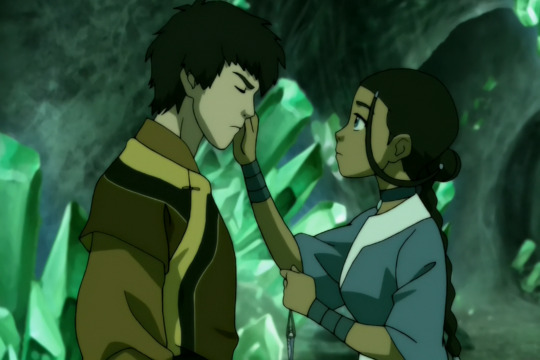
Yes, I'm here for Zutara. No one can change my mind. I've been shipping them since I was a kid, long before I knew about shipping and fandom. When I re-watch ATLA, I shipping them even more. When I watch Zutarian art and video, I shipping them even more. When I read Zutarian meta, fanfic, or headcanon, I shipping them even more. Even when I read canon shipper points, I still love and shipping Zutara even harder. I mean, just look at their chemistry! And some people still denying.
#atla zutara#zutara#anti anti zutara#pro zutara#antikataang#anti kataang#anti maiko#katara x zuko#zuko x katara#katara and zuko#zuko and katara#momtara and dadko#dadko#momtara#steambabies#zutara fanart#zutara meta#anti bryke#zutara was robbed#zutara analysis#zutara edit#zutara headcanon#zutara fandom#anti zukka#zk
197 notes
·
View notes
Text
As enemies, Zuko was the impulsive hot-head while Katara was the level-headed voice of reason.
As they join forces, it's Zuko who learns to have a calmer demeanor while Katara acts more hot-blooded and bolder.
Funny how that works.
336 notes
·
View notes
Text
Recently, I've pondering Book 2 and 3 of ATLA, and I reached a conclusion that surprised me a little.
Specifically, this: Zuko would have been very unlikely to join Team Avatar if not for Katara.
Now I'm not saying that Zuko had a secret crush on her or anything. As much fun as that concept can be to explore in fics, I don't love the idea of Zuko's redemption being motivated by romantic interest, and his canonical arc is clearly driven by his own evolving understanding of the world and the morals that come along with that understanding. Still, if you cut out his interactions with Katara, especially in the crystal catacombs, I just don't see him ever taking that last step to turn against his father and join Team Avatar. He would have been discontented in the Fire Nation, sure. Spending a few years away from home with a guardian who genuinely cared about and protected him could easily push him that far all on its own. He might have become disillusioned enough with the Fire Nation and its role in the war to run away too. Zuko spent enough time in the Earth Kingdom, learning about the people and their suffering, to have doubts and regrets when he finally learned about Ozai's true plans.
But without Katara reaching out to him in the crystal catacombs (or more accurately, Zuko reaching out to sympathize with Katara, and Katara reciprocating), I'm not convinced that he would have considered his future or his place in the world enough to go farther than that. To leave and to join the enemy. And even if he had considered joining Team Avatar, I'm not convinced that he would have thought he had a chance of being accepted if he hadn't shared that moment in the crystal catacombs with Katara.
I mean... sure, Aang sort of reached out to Zuko way back in Book 1. But even leaving aside the fact that that was one moment several months before Zuko finally left home (and an offer that brief and that old is probably shaky at best), it wasn't an offer of friendship in quite the same way that Katara's kindness was. What Aang said to Zuko was:
You know what the worst part of being born over a hundred years ago is? I miss all the friends I used to hang out with. Before the war started, I used to always visit my friend Kuzon. The two of us, we'd get in and out of so much trouble together. He was one of the best friends I ever had, and he was from the Fire Nation, just like you. If we knew each other back then, do you think we could have been friends, too?
"If we knew each other back then, do you think we could have been friends, too?"
It's a hypothetical question. Aang is thinking back to a time before the war, to the people he knew in the Fire Nation an entire lifetime ago, and trying to imagine where Zuko might have fit into that time and those relationships. He doesn't reach out a hand to directly offer Zuko a friendship in the present (and frankly, it wouldn't make sense in the moment if he had), nor does he ever make another offer of friendship until after Zuko actually joins the team. Every encounter between Zuko and Aang from The Blue Spirit on through The Western Air Temple is either a) a fight, b) Aang sparing Zuko's life while Zuko is unconscious (and therefore unable to see the kind gesture and interpret it as an offer of friendship), c) unwilling cooperation against a common enemy, or d) ... That Face that Aang makes at Zuko after interrupting him and Katara in the crystal catacombs.
Maybe it's just me, but... none of those interactions exactly set up a strong foundation for a future friendship, or even a future alliance. If Aang's old "offer of friendship" was all Zuko had to go on, then joining Team Avatar would have been a long shot. An extremely long shot.
By contrast, Katara bares her heart to Zuko and, at least in the moment, makes it clear that her kindness is deliberate. They've fought against one another time after time, they've been unwilling allies in the fight against Azula, and they've had some... generally antagonistic face-to-face interactions as well. But even after all of that, Katara offers to heal Iroh with very little hesitation in The Chase, then offers compassion to Zuko himself in The Crossroads of Destiny. She openly shows Zuko that there's a chance for him, and even when he turns against her in CoD, her angry dialogue still reflects the fact that she thinks he can be better. That she wants and expects him to be better. "I thought you had changed" isn't just anger, it's also a sign that her trust and kindness in the catacombs was genuine.
It's a sign to Zuko that if he can become the person who Katara thought he was for those few minutes in the caverns beneath Ba Sing Se, he might be able to prove himself worthy of that same trust and kindness again. And once Zuko has finally had enough of living under his father's thumb, of sitting silent on the sidelines while the world burns around him, once he leaves his old life behind for good, it's the beacon that draws him onward into a new life and a new purpose.
I can't claim to know exactly what would have happened if Zuko had never shared those pre-redemption moments with Katara. I'm just one random fic writer in a quiet corner of the internet, but I don't think it's unreasonable to say that her kindness to him in Book 2 made his decision easier. Without Katara, Zuko still might have left the Fire Nation behind. He still might have told off his father and tried to rescue Iroh from prison during the eclipse, but that doesn't necessarily mean that his next step would have been to run off to the Western Air Temple and offer himself up as a teacher.
Without Katara, Zuko might have fallen into the cracks in between the Fire Nation and Team Avatar. He might have become a different type of dissenter - maybe a less obtrusive one, like Piandao or Jeong Jeong, or he might have fallen back into his vigilante persona. He might have gone searching for his mother while the war kept raging on the other side of the ocean, or he might have tried to settle down into the type of quiet life that Iroh wanted for them both in Ba Sing Se. But regardless of what choice Zuko would have made, I think it would have been much harder for him to choose Team Avatar if he hadn't had Katara's voice in the back of his mind, telling him that he could be better, and that if he was, he might have a place with her and her friends.
Ship them or not, Zuko and Katara had an incredible bond that shaped a lot of the show. And while I'm not exactly on Team 'Zuko had a secret crush on Katara from the beginning' because of what it can do to his character arc if it's not handled carefully, I think I just found myself squarely on Team 'Zuko changed because it was right, and Katara opened the door for everything that came after.'
#zutara#not necessarily romantic in this post#but you know how the fandom is#atla meta#zutara meta#zuko#katara
451 notes
·
View notes
Text
Zutara lens vs k.ataang lens.
I been thinking about how some of the messages in avatar Change if you watch them through a k.ataang lens vs a zutara lens.
The big one is Jet.
In the zutara lens, jetara can be seen as foreshadowing for zutara. Jet and zuko have alot in common. Rugged teenage boys with traumatic back stories. They both betray katara and test her character, katara’s biggest strength and weakness is her companion. Katara is extremely trusting and it’s really satisfying to see her grow but she never loses her ability to love. The one difference we see is Zuko working to earn her forgiveness. jet could have had this arc too but his untimely death cut it short. I don’t think jet was all that bad of person he was consumed by grief and bitterness, and I think he did feel bad for hurting katara, when his life flashes before his eyes she was a big piece of it. He even told her that he changed. He just didn’t have the time to show her.
Taking it a little deeper jet dying could also foreshadow Zuko almost dying from lightning. It’s a bittersweet lesson how we waste time holding grudges and sometimes people don’t have the luxury of apologizing to the people they love. Just a thought.
So from a k.ataang lens it leads more towards the lesson that katara need to stop letting these “bad boys” break her heart, “dumb girl your too trusting just give the sweet guy a chance”. And some will feel these types of lessons have aged poorly, but they were quite common in the early 2000s and targeted at kids especially for shows with male leads. But I do believe that this contradicts the overall message of avatar as a whole. In the episode the avatar and the fire lord, it explains how all people are capable of good and evil. And people need to be given a chance. People are complex. But I guess not if they are a “bad boys” who want your forever girl those guy are just bad. Also I think this is why a lot of people misunderstand the southern raiders episode and why Zuko gets characterized as the manipulator and katara is misguided and need the “nice guy” to save her.
#zutara#anti-kataang#zutara meta#I sure this has been said before but I was just thinking#I swear zutara gives the show so much more depth#that’s a hill I will die on#jetara is valid
173 notes
·
View notes
Text
"Zuko would take a lightning for anyone–"
But it was Katara that he chose to invite.
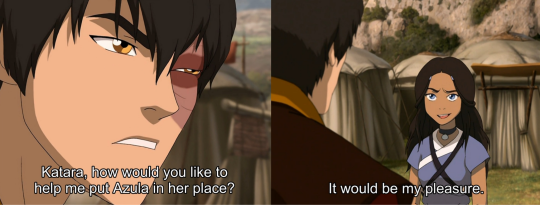
"Zuko would take a lightning for anyone–"
But Azula knew to aim at Katara.

"Zuko would take a lightning for anyone–"
But the scene was romamtically coded.
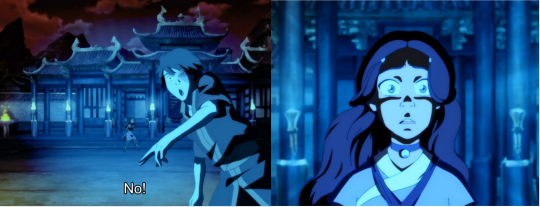
"Zuko would take a lightning for anyone–"
But Katara needed to get to heal him.
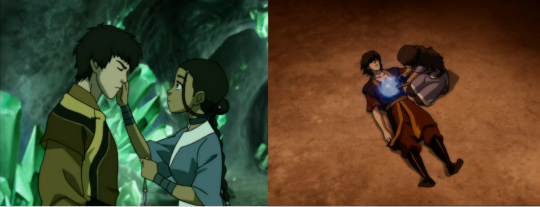
"Zuko would take a lightning for anyone–"
But it was Katara who was with him in season finales.
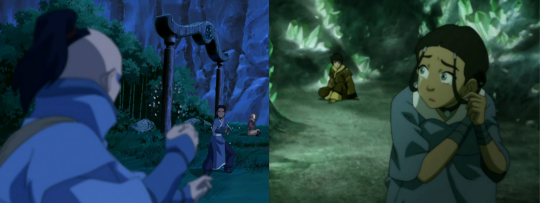
"Zuko would take a lightning for anyone–"
But he needed to choose Katara over Azula.

"Zuko would take a lightning for anyone–"
But Shu needed to survive in this life.
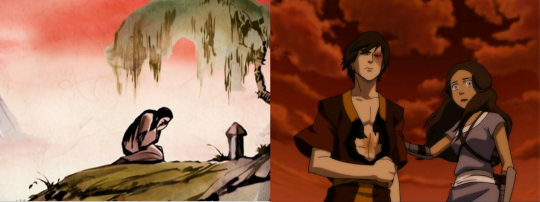
"Zuko would take a lightning for anyone–"
But the writers deliberately chose Katara.
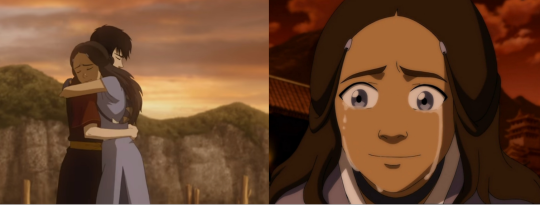
Inspired by @captain-konami-code 's "They were enemies"
#DISCLAIMER: I know this post isn't a full convincing argument. It's more for people who already agree.#it *definitely* falls under shitpost#zutara shitpost#<- the true nature of the post#zutara meta#<- for exposure#zutara#anti anti zutara#pro zutara#zuko x katara#katara x zuko#zukoxkatara#kataraxzuko#zutara analysis#zutara evidence#zutara forever#zutara nation#zutara was robbed#zutara supremacy#zutara should have been canon#atla critical#atla critisism#katara#zuko#prince zuko#katara of the southern water tribe
3K notes
·
View notes
Text
Is Katara "Motherly"? - The Discourse
The whole "is Katara motherly" discourse is a little annoying to me because for one thing its impossible to deny that in canon she acted motherly towards Aang, Sokka, and Toph, with Sokka even saying at one point when he thought of his mother Katara's was the face that came to mind.
But the other problem is that this fits into the shows themes so perfectly of children being thrust into adulthood and enormous amounts of responsibility too easily because of war and the subsequent (or end goals of) genocide, cultural genocide, and colonization. Katara's motherly characteristics are of the show's own making, they're right there in the text and their there for a reason, and although they weren't given enough attention as they should have been, there is no doubt that this is treated as, not exactly a tragedy, but as something bad and debilitating to Katara and her teenagerlike need to goof around with her friends.
But for whatever reason, the fandom seems to think that this characterization is fan made. Katara is supposedly forced into a motherly role by the fandom, particularly the zutara fandom, when in reality it is the show that does this to her. And the whole idea of momtara and dadko is that Katara doesn't have to be the mom anymore. She doesn't have to be the one solely responsible for the chores and the cooking and the emotional labor. She has a partner, and equal, who is willing to put forth the time and energy to assist her in what she feels obligated to do, and to tell her to go sit down sometimes before she burns herself out.
Could the other kids besides Zuko do this? Of course. But as we've already established, everyone in the gaang besides Suki shoves Katara into a motherlike role. Is this their fault? It's hard to say. Toph at least has a heart-to-heart with Katara about it, and Sokka's idea of her as a mother largely stems from trauma.
But my significant problem with Katara's motherly traits comes with the fact that there is no real closure to that arc in the "Runaway". Toph and Katara talk mostly about Toph's parents, and Toph tells Katara that she thinks she is capable of having fun. But other than that, there's nothing. The boys don't have to come to terms with the fact that Katara does not want to be seen (solely) as motherly or put in that position. Instead, the show gives us a few colorful explosions and subtlety implies that it is a little bit Katara's fault that she is seen that way. But again, that's not the fault of the zutara fandom or a reason the trope of momtara and dadko is problematic. It seeks to acknowledge these character traits in Katara, which a lot of kat@angers refuse to do, and give her a way to work past the trauma that caused them and help her adjust to a more healthy amount of stress and pressure on herself for a kid her age.
#the random desire to write in conclusion at the end of these#katara#atla#avatar the last airbender#zutara#anti kataang#the gaang#zuko#toph#sokka#suki#aang#bryke critical#anti bryke#atla meta#katara meta#zutara meta#katara deserved better
171 notes
·
View notes
Text
I love fics where the Gaang finds out about the story behind Zuko’s scar. That said, I still think Zuko and Katara’s interaction in Crossroads of Destiny is the most powerful scar scene possible, precisely because Katara does not get his backstory, yet treats him with compassion anyway.
From The Storm onwards, Zuko’s scar becomes a symbol to the audience. Zuko’s scar is inextricable from his inherent goodness, which is constantly warring with his desire to please his cruel father. I think that’s why fans are so eager to see the Gaang find out the story behind his scar — so that the Gaang can see Zuko the way we’ve seen Zuko since season 1, so that they can understand the full tragedy of his story, and so that Zuko can get the comfort he really, really needs and deserves.
But Katara doesn’t offer to heal his scar because he’s good, or because she’s appalled that his father was abusive and awful. She offers to heal his scar because she sees that he’s hurting, and she wants to make that hurt go away. Knowing his backstory would not have made her act any differently, because she had already offered the full extent of her compassion. Katara knows firsthand what he’s capable of. She’s seen him at his very lowest. Yet she chooses to comfort him anyway.
And Zuko — Zuko, for whom pain is about as natural as breathing, who doesn’t care if he lives or dies, whose list of “people who have seen the worst of him and care about him anyway” starts and ends with his uncle, who knows full well that Katara travels with both the literal hope of the world and her own brother…no wonder he lets her touch his scar. No wonder he wants her forgiveness so badly. No wonder he jumps in front of lightning for her and reaches for her while he’s literally dying. Because Katara didn’t see the good in him: she saw the human in him. Because to a girl defined by her compassion, they were the same thing. And to a boy who had been desperately trying to bury his own humanity, it was everything.
#this ship makes me so fucking feral I swear#like regardless of whether you’re looking at it from katara’s pov or zuko’s pov they just offer each other THE thing they need#katara’s compassion in the context of zuko’s trauma just means so much to me…she takes his pain so seriously#and who else does that? not his canon gf#zutara#zutara meta#pro zutara#My meta
186 notes
·
View notes
Text
ana's meta masterlist
Pro-Zutara:
the official zutara dissertation: part 1 | part 2
zuko, aang and taking lightning for katara
zutara and romantic coding
"you rise with the moon, i rise with the sun" is a zutara line
zutara and thematic significance
zutara vs jetara
zutara parallels in the awakening
zutara's narrative culmination
zutara in the crossroads of destiny:
azula vs katara
love as resistance in the catacombs
zutara in the southern raiders:
the true source of katara's anger at zuko
katara bloodbending before zuko
the narrative relevance of zutara
zutara and bloodbending
zutara's narrative symmetry
why zuko had to betray katara in ba sing se
Anti Anti-Zutara:
the official zutara dissertation (p.3)
"zutara would face too much opposition from their countries"
"zuko and katara are a colonizer/colonized ship"
"zuko and katara would fight all the time”
"platonic zutara is better than romantic zutara"
"fire lady katara is racist"
“zuko would’ve taken lightning for anyone”
“katara is too traumatized by the fire nation”
ATLA Ship Criticism:
the official zutara dissertation: part 4 | part 5 | part 6
why mai.ko was never intended to be canon
mailee is a better ship than mai.ko
how kat.aang could've been fixed
kat.aang's lack of trust in the southern raiders
emotional labour in kat.aang
kat.aang’s narrative imbalance
comparing katara and aang's parenting
why the fortuneteller does not foreshadow kat.aang
ATLA/LOK:
azula/katara parallels
katara's choice in the crossroads of destiny
was zuko's betrayal in-character?
zuko's comments in the southern raiders
zuko's comments in the southern raiders (pt. 2)
zuko is not a “bad boy”
sokka didn't feel inferior to katara
did mai fear azula?
comparing mai and toph
sexism in the water tribes
thoughts on the atla comics
gratuitous violence in the legend of korra
The Hunger Games:
zutara and everlark parallels
zutara and everlark parallels (pt. 2)
gale's arc in the hunger games trilogy
the myth of humanity's inherent evil
the ending of lucy gray
Squid Game:
individualism under capitalism
the ethics of billionaires
#zutara#anti kataang#anti maiko#zutara meta#been intending to do this forever but i'm on this hellsite so much that going through my archives took an eternity lmao#anyway here's a collection of patented ana rambles
526 notes
·
View notes
Text
As I write through the timeline of Sozin's Comet in my current fic, I'm having a fresh bout of finale feels. In particular, I've been ruminating on how Aang and Katara's romantic ending unfolds in a way that undermines Katara's character arc. (And this rumination has grown into a wall of text. Truly, who let me on this platform?)
I'm not even thinking about the kiss. I've been stuck on that scene at Zuko's coronation where the shot pans around Aang then Katara, gazing dreamily up at the Avatar. You know the one. The moment when we the viewers are suddenly made to understand that she's admiring Aang anew, romantically.
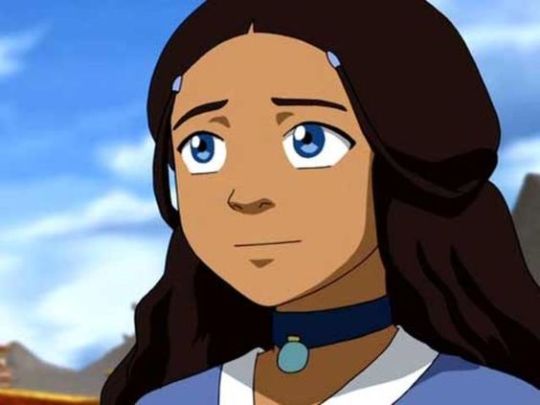
Prior to this, the last time we see Katara and Aang interact is before the Avatar disappears. More specifically, we see Aang huff off after getting frustrated at Katara for trying to help when she doesn't fully appreciate the moral quandary he's grappling with.
For Katara, who has carried the wounds of her father leaving her behind for war most of her life, it is hard to imagine Aang's departure could fail to stir up feelings of abandonment, even if she doesn't believe he intended to disappear. But, like Zuko says to her as Aang first walks away, the Avatar does need time to figure out his way forward alone.
To find a path to victory that does not compromise his ethical framework is a solo undertaking for the Avatar, one his friends have demonstrated they cannot be part of, not even Katara, who has always been there to lift him up before. That he didn't need to rely on his steadiest supporter for this marks important character growth for Aang; we already have been told that letting go of some level of his earthly attachment to Katara is built into his character journey. And the need to uphold his peoples' legacy is an essential character motivation for Aang. There is something powerful about the notion that, as the last airbender, he must seek out the right approach to this last task on his own.
But what about Katara's essential character motivations? As we're told and shown, she will never turn her back on the people that need her. It's one of her great virtues, and we're given no reason to think otherwise. Helping people who need her is where we see Katara find her greatest fulfillment. For most of ATLA, helping Aang is at the heart of this.
But at the coronation? Aang has just come back after appearing to abandon Katara to be celebrated for a victory he didn't need her help to achieve.
And standing next to Aang is Zuko, who acknowledged that he needed Katara's help to embrace his destiny, and who in turn, granted her the opportunity to embrace hers.
I think it's worth pausing on the fact that the show gives Katara a tremendous arc. She transforms from a child whose life has been upended by war—gifted with a power that she can't harness, and burdened with grief and hurt she can't let go of—into a catalyst for global change, one of the greatest-ever masters of her element, and a person capable of offering world-changing forgiveness where it is earned. When Katara was a child, the Fire Nation came uninvited into the heart of her community and upended her life, and in the finale, she arrives in the heart of the Fire Nation to upend the same order that ravaged her home in the name of peace—an achievement that is made possible by both her hard work (bending mastery) and her compassion (extending empathy, forgiveness and life-saving assistance to Zuko).
In the finale, Katara affirms that by helping the people who need her, she can change the world.
In the finale, Aang affirms that singular conviction to his ideals can guide his way, even if it is a path he must walk alone.
Can these visions of self and purpose be reconciled in a healthy partnership? Certainly. In fact, I can see how Aang letting go of Katara's constant help—and Katara letting go of an Aang-centric identity—supports a healthy future romantic relationship for the two of them, where their dynamic finds a balance it never has during ATLA. But Katara and Aang haven't worked through any of that yet. If they have spoken at all before the coronation—if he has, for instance, apologized for disappearing—it was not deemed essential content for the viewer.
And what marks Katara's epiphany of love? The moment when Aang is celebrated as "the real hero" for what he has achieved in her absence. For this to ring emotionally true, for this to be the moment she knows she loves him, she must subsume her character arc and motivations (which are inherently collaborative) to Aang's individual journey. His story, his desires, they come first. It's his show, after all.
And none of this is news, of course. It's barely boot-scuffs on well-trodden ground. The abandonment of Katara's hero arc is canon; where the hell is her statue? etc.
But still, I'm stuck on Katara watching proudly from the crowd. If that moment doesn't feel quite right—it never has for me—maybe you want more for Katara. I'd put her on the dais, but I'll settle for something subtler.
Just for a moment, after she looks up proudly at Aang, let's nudge her admiring gaze a little to the right. Who does she see? Someone who has come to deserve his honorable destiny because he would cast it aside to save a life—her life, the life of a girl he once betrayed to lay claim to that purported honor. Jumping in front of that lightning, Zuko shows he will choose humans over concepts and that, at any cost, he will be there for the people that need him. That's what will make him a good leader. He and Katara, over long-woven arcs, affirmed this truth together.
She looks on admiringly. She made this possible.
She should be proud. Of both of her friends, but more importantly, of herself.
Is this an argument for Zutara over Kataang in the finale? I don't think so. That's probably a different accidental essay.
This is merely a longwinded observation that Avatar the Last Airbender built powerful, beautiful, arcs. But in the very end, it didn't tend them all the same. And after all this time, it still rankles.
#not me getting steamed about this in literally 2023#truly for why#zutara#zutara meta#sozin's comet#in this essay i will
368 notes
·
View notes
Note
I really hate when people compare canon Zutara to pocohontas but I have to admit, there are *certain people* in this fandom who very much lean into the whole “kidnapped indigenous woman falls in love with her captor/abuser” trope and as a Native who loves Zutara I find that really gross
no i totally totally agree. unfortunately there are people who are apart of the fandom who are also really gross in their portrayal of zk. ive seen fics that really play into it even fics where they have zuko KIDNAP katara and its honestly so disgusting. just because it is happening within the community does not make it okay.
i feel like theres so many obvious reasons why comparing zutara to a romanticized movie about an actual indigenous woman and a colonizer is weird and icky and just offensive, but clearly there are people who don't get it.
other people's pain is not something that you can romanticize and fetishize. Native peoples have been treated so horribly by european colonizers and white americans today that to pretend that a relationship between a colonizer and Native woman is hot is just wrong. i think that in part of defending the idea that zutara is not a colonizer relationship, we also need to hold creators within the community to those same standards. it's not okay to compare the two, whether its as an excuse to hate on the ship or if its coming from a shipper. comparing zutara to Pocohontas is so, so gross.
37 notes
·
View notes